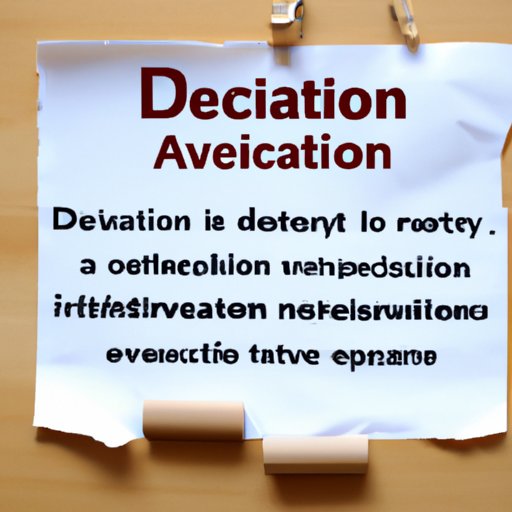Introduction
When it comes to real estate law, there are certain terms that can be confusing. One of these terms is the difference between a “notice to vacate” and an “eviction.” While both involve a tenant being asked to leave a property, there are important differences in the legal process and consequences involved. It’s important to understand the differences between a notice to vacate and an eviction in order to know your rights and responsibilities as a tenant or landlord.
Exploring the Difference Between a Notice to Vacate and Eviction
Let’s start by looking at each term separately. A notice to vacate is a formal request from a landlord to a tenant to leave the rented premises. This document is usually in writing, and it may include a timeline for when the tenant must leave the property. A notice to vacate may also include details about why the tenant is being asked to leave and any applicable laws or regulations that apply.
An eviction is a court-ordered process in which a tenant is legally forced to leave a rental property. The eviction process begins with a notice to vacate, but if the tenant does not comply, the landlord can file a lawsuit in court. If the landlord wins the case, the court will issue an eviction order, which is an official document requiring the tenant to move out. The tenant must comply with the order or face legal penalties.

What You Need to Know About Notices to Vacate and Evictions
The process for a notice to vacate and an eviction are different, but there are some similarities. For instance, in both cases the tenant must receive proper notification from the landlord. Depending on the state, this may mean that the landlord must give the tenant written notice, either at least 30 days or even up to 90 days before the tenant must leave the property. The tenant must also receive notice of their rights and any applicable laws or regulations.
When it comes to rights and responsibilities, tenants have certain protections under the law. For instance, tenants cannot be evicted without cause, and they have the right to a fair hearing if they wish to contest the eviction. Landlords also have rights, including the right to collect rent and enforce the terms of the lease agreement. In addition, landlords are responsible for maintaining the property and ensuring that it meets all applicable laws and regulations.
Is a Notice to Vacate the Same as an Eviction?
No, a notice to vacate and an eviction are not the same thing. A notice to vacate is a formal request from a landlord to a tenant to leave the rented premises. An eviction is a court-ordered process in which a tenant is legally forced to leave a rental property.
It’s important to understand the differences between a notice to vacate and an eviction in order to know your rights and responsibilities as a tenant or landlord. Knowing the difference can help you avoid costly mistakes and potential legal issues.

The Basics of Notices to Vacate and Evictions
There are several types of notices to vacate, including no-cause notices, breach of lease notices, and end-of-lease notices. A no-cause notice is a request to vacate without specifying any reason, while a breach of lease notice is issued when the tenant has violated the terms of the lease agreement. An end-of-lease notice is issued when the lease term has expired and the tenant is required to leave the property.
There are also several reasons why a landlord may issue a notice to vacate, including failure to pay rent, breach of the lease agreement, or the expiration of the lease term. In some cases, the tenant may be given the opportunity to cure the issue before the notice to vacate is issued. Common terms in a notice to vacate include a timeline for when the tenant must leave the property and any applicable laws or regulations.
Evictions are more complicated than notices to vacate, as they require court intervention. In most states, the landlord must file a complaint in court and prove that the tenant has violated the lease agreement or failed to pay rent. The tenant then has the opportunity to contest the eviction in court. If the landlord wins the case, the court will issue an eviction order, which is an official document requiring the tenant to move out.

Understanding the Differences Between Notices to Vacate and Evictions
There are several key differences between notices to vacate and evictions. Notices to vacate are generally issued by the landlord, while evictions are court-ordered processes. Notices to vacate do not necessarily require court intervention, while evictions do. In addition, notices to vacate may be issued for various reasons, such as failure to pay rent or the expiration of the lease term, while evictions are typically only issued when the tenant has violated the lease agreement.
It’s also important to note that there are different legal requirements for notices to vacate and evictions. For instance, the landlord must provide proper notification to the tenant, and the tenant must receive notice of their rights and any applicable laws or regulations. In addition, the landlord must follow the applicable laws and regulations when issuing the notice to vacate. Finally, the tenant must be given the opportunity to cure the issue before an eviction can be filed.
How to Tell the Difference Between a Notice to Vacate and an Eviction
If you’re a tenant or landlord, it’s important to understand the difference between a notice to vacate and an eviction. The best way to tell the difference is to evaluate the situation. If the tenant is being asked to leave due to a violation of the lease agreement or failure to pay rent, then an eviction is likely. However, if the tenant is being asked to leave for other reasons, such as the expiration of the lease term, then a notice to vacate is likely.
It’s also important to know your rights and responsibilities when it comes to notices to vacate and evictions. Tenants have certain protections under the law, including the right to a fair hearing if they wish to contest the eviction. Landlords also have rights, including the right to collect rent and enforce the terms of the lease agreement. Knowing your rights and responsibilities can help you avoid costly mistakes and potential legal issues.
Conclusion
Notices to vacate and evictions are two very different processes, and it’s important to understand the differences between them. A notice to vacate is a formal request from a landlord to a tenant to leave the rented premises, while an eviction is a court-ordered process in which a tenant is legally forced to leave a rental property. Knowing the difference can help you know your rights and responsibilities as a tenant or landlord.
(Note: Is this article not meeting your expectations? Do you have knowledge or insights to share? Unlock new opportunities and expand your reach by joining our authors team. Click Registration to join us and share your expertise with our readers.)
